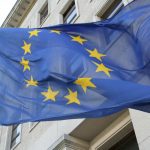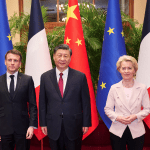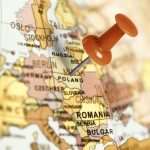Malte Zabel – Push for momentum: Serious tone, many initiatives, questionable substance
After Ursula von der Leyen withstood considerable headwinds over the summer, the Commission President was under pressure to regain momentum. She sought to do so by evoking the gravity of the moment, delivering bold rhetorical appeals, highlighting selected successes, and announcing new initiatives. Some examples:
- Highlighting the gravity of the moment: Europe, she argued, is engaged in a ‘fight’ and stands at a crossroads. She said the continent will either unite or allow itself to be paralysed. Europeans, she warned, feel the ground trembling beneath their feet.
- Rhetorical appeals: Europe must assume responsibility for its own defence. Europe must do more in the Middle East conflict. Europe must achieve the ‘next reunification’ (which is shorthand for enlargement). Europe must complete the Single Market (with a nod to Letta).
- Successes: These include the SAFE programme for defence investment, the Clean Industrial Deal, and additional funding for managing migration.
- New initiatives: Examples include the launch of a European Semester for Defence, a €1.8 billion Battery Booster package, a plan for affordable housing, and the creation of a new Centre for Democratic Resilience.
In terms of substance, von der Leyen focused on the expected priorities of geopolitical and security threats – including the wars in Ukraine and Gaza – as well as Europe’s competitiveness in tech sovereignty, climate, and social policy, although she touched upon other areas too.
Overall, she delivered a speech that struck a tone commensurate with the seriousness of the moment. Yet many of the new initiatives remain vague, particularly in the field of economic policy, which, only a year ago, she declared as the top priority.
On this front, von der Leyen largely referred back to projects already in motion, such as the Omnibus, which was announced in February. But there has been no tangible progress on the underlying structural issues, such as capital markets union. Still, some announcements stood out, most notably the Commission’s intention to freeze funds for Israel and propose a new sanctions package on the country. That said, the latter is a prime example of how the Commission’s success always depends on whether the Member States are on board. Von der Leyen’s prominent push for unity is therefore nothing new – but it remains of central importance.
Miriam Kosmehl – Key messages to Member States: unity, ambition, urgency
Commission President von der Leyen began and concluded her address by emphasising that Europe must remember how to fight. Notably, she devoted the most prominent part of her speech to explicitly identifying the threat posed to all of Europe by an imperial and aggressive Russia under a president who has no will to negotiate. Highlighting the most recent instances of Russian escalation, among them Russian drones entering Poland, she underlined that Europe will further strengthen and expand Ukrainian and European defence industrial capacities and defend ‘every inch of its territory’.
Presenting the poignant example of a teenager originally from occupied Mariupol, abducted by Russian forces and rescued by his grandmother at great personal risk, she sought to convey emotionally how this is a war over political order and, fundamentally, over values – a choice between democracy and autocracy.
Unity featured most prominently in her address – among Member States, European institutions, and pro-democratic political forces. Aware that the outcome of the protracted global power struggle Europe must resist will hinge on which side can maintain cohesive alliances, she warned against paralysis through division.
Preserving majorities while pressuring Russia is a delicate balance. It is therefore consistent that von der Leyen did not make a plea for the confiscation of Russian central bank assets in the EU but underlined collective risk-sharing and a workaround: Ukraine would only have to repay loans financed with the windfall profits of these funds if Russia itself were first held responsible. Outwardly, Brussels – normally hesitant about secondary sanctions – has been warming to measures affecting third countries.
When the Commission President came to future enlargement, Georgia was notably absent from her remarks. From the other candidates’ perspectives, it was good to hear about ‘re-uniting’ in Europe with security guarantees for all, recognising their sense of long-time, historic belonging.
Clearly, the keys to today’s challenges lie not in the technical details of new initiatives, but in political will. Ursula von der Leyen’s presidency remains one of the most politically charged of any Commission.
Martin Hullin – Europe’s tech sovereignty: von der Leyen’s blueprint with gaps
Ursula von der Leyen’s State of the Union makes technological sovereignty a central theme with the framing that ‘our independence depends on our ability to compete’.
The multitude of new measures shows the Commission is now aware of the deep technological dependencies Europe is facing. However, the programme seems more like a collection of well-intentioned individual initiatives than a coherent strategy.
While the 28th regime finally intends to create a uniform legal framework for tech companies and the Competitiveness Fund takes up Draghi’s demands to keep talent and innovation in Europe, there is no clear vision of what specific competitive advantage Europe wants to develop.
This gap is critical because, without a systemic alternative to the American tech stack, individual measures remain piecemeal. The Trump administration can continue to exploit this dependency.
Europe must define what its unique selling point should be. For example, could this be trustworthy infrastructure, or the scaling of open technologies, and trustworthy building blocks as so-called digital commons for partners worldwide?
The simultaneous emphasis on the US trade agreement and diversification ambitions highlights the fundamental dilemma. Europe wants independence but is shying away from open confrontation. This was demonstrated by Commissioner Ribera being asked to forego the usual large press conference after imposing a €2.95 billion fine on Google’s market power in the advertising sector. Don’t poke the bear.
Linking defence and technology, such as drone wall and space surveillance, and clean tech initiatives with Made in Europe criteria are the right approaches. The Media Resilience Programme and possible social media restrictions for children – ideally without copying the Australian model – demonstrate a willingness to regulate. But without fundamental and systemic investment in a European tech stack and clear strategic positioning, these measures will remain fragmented.
Von der Leyen’s speech shows greater awareness of the problem and a willingness to act by incentivising the private sector, but without further embedding this in a much-needed systemic strategy for Europe’s technological resilience and sovereignty.
Jake Benford – EU external partnership strategy
The President’s address stressed partnerships with like-minded nations – but with a more defensive edge than in past years. Ursula von der Leyen pledged continued support for Ukraine with the US and allies, though this now reads as much about holding a fragile coalition together as about championing values.
Economically, she pointed to trade and raw material deals with democracies such as Mercosur, Mexico, and Australia. These aim to reduce over-reliance on authoritarian suppliers. Yet many of these agreements remain politically contested or vulnerable to partner backsliding. References to cooperation on AI, climate, and infrastructure under G7 frameworks underscored ambitions, but implementation depends on partner reliability and EU unity.
Enlargement rhetoric towards Ukraine, Moldova, and the Balkans framed them as future members, but integration remains uncertain. Overall, the speech marked a shift – partnerships are no longer framed as an expansive mission, but as hedges against insecurity and vulnerability.
Claudia-Dominique Geiser – Simplify rules but also break down barriers: the real road to EU competitiveness
Ursula von der Leyen is right: to strengthen Europe’s independence and competitiveness, it must become easier to do business in Europe – by simplifying rules but also by dismantling obstacles in the Single Market.
So far, the Commission’s main tool has been cutting red tape – and rightly so. The EU rulebook is often overly complex, with legislation overlaps, and rules that need streamlining. It is no surprise that von der Leyen defended her simplification agenda today. However, the fleet of Omnibuses has faced considerable issues, ranging from rushed design of proposals to failing to secure political majorities. Instead of providing immediate relief for companies, political infighting has stalled some proposals and deepened distrust between political parties, as was clearly visible in today’s speeches of S&D and EPP leaders.
But simplification must mean more than cutting rules. Europe’s heavier burden lies in its fragmented Single Market. Companies still face a myriad of barriers when operating across borders. The IMF estimates that these barriers amount to a tariff equivalent of around 44 percent for trade in goods, and 110 percent for services.
Today, von der Leyen announced a Single Market roadmap to 2028 with political deadlines for areas where market fragmentation remains high: capital, services, energy, telecommunications, knowledge and innovation, and the so-called 28th regime for innovative businesses. This is a good step, complementing the Single Market Strategy announced earlier this year.
But as so often, success will depend on the willingness of Member States to set national interests aside for the greater good of the Union. It remains to be seen whether von der Leyen can rally them to act with the urgency and unity the Single Market agenda demands.
Brandon Bohrn – Direct and subtle signals in Europe’s partnership with the US
Ursula von der Leyen’s speech highlighted Europe’s difficult balancing act: maintaining a partnership with an increasingly volatile US administration while reducing dependencies and asserting its own future.
She reaffirmed the US as Europe’s most important ally in trade, security, and defence, citing €500 billion in exports and millions of jobs tied to the relationship. The summer trade deal, she argued, secured the best possible outcome for European industries, though her claim drew only tepid applause in Parliament.
Concurrently, von der Leyen made clear that Europe will never surrender its authority to set environmental or digital regulations – amid mounting pressure from the Trump administration – and must expand its trade relations beyond the US. Agreements with Mexico, Mercosur, and India were framed as critical steps in this direction.
Equally telling were her more subtle critiques. Calling on Europe to ‘step up where others have pulled back’, she urged the world’s brightest minds to ‘choose Europe’, outlining initiatives to attract top researchers. Additionally, she announced a new global health resilience initiative, voicing alarm at the spread of disinformation undermining vaccination campaigns against measles and polio – a veiled reference to troubling trends in the US and elsewhere that erode trust in science.
Von der Leyen placed strong emphasis on media freedom, warning that capturing the independent press is often the first step toward dismantling democracy. A new Media Resilience Programme, she said, would bolster journalism, the ‘backbone of democracy’. Her comments implicitly contrasted with the US, where public broadcasters face cuts and closure, reporters face legal pressures, and institutional access is restricted.
Her point was clear: the US remains indispensable, but Europe must diversify its partnerships and, in the vacuum of global leadership left by Washington, step forward itself in climate, science, health, and democracy to safeguard its own future.
Etienne Höra – Best trade deal or everyone’s best trading partner? Choose one
Ursula von der Leyen praised the trade deal with the US as the ‘best possible deal’, better than what its ‘competitors’ obtained, and the reasonable alternative to the ‘chaos of a full-fledged trade war’. In the same breath, she highlighted the need to forge new partnerships, both through trade agreements, and by teaming up with like-minded partners to reform the WTO.
Diversification and connecting to new markets are worthwhile goals for EU trade policy, even if they will not directly replace the US demand lost to tariffs. However, they run up against a fundamental contradiction: as attractive as it may seem to separate the two worlds of trade – one power-based, in which the EU reluctantly folds to US pressure, and the other based on rules and partnership – this separation is impossible to maintain. The EU can hardly form new trusting partnerships if its partners believe that the bully gets the better deal, and double standards are a shaky basis for reviving trade multilateralism. Understandably, in its trade negotiations with the EU, India has asked for the same concessions on CBAM as the United States, and other partners are likely to do the same.
According to von der Leyen, ‘the world wants to choose Europe’. However, if the EU fails to address this tension in its trade policy – between what it wants and what it does, between being the best trading partner, and getting the best deal – it will be far less attractive internationally than it could be.
Cora Jungbluth – The EU is ill-prepared for a power-based world order
Ambition, unity, urgency – Ursula von der Leyen mentioned these three aspects prominently in her speech. All are needed direly to secure the EU a position as a geopolitical player in the world order, quickly changing from rules-based to power-based.
There certainly is no lack of ambition in the EU. But the Commission displays a serious sense of urgency. For some Member States, the latter deserves at least a question mark. The lack of unity, however, is a dangerous no-brainer, especially when it comes to issues that may require a redistribution of resources and competencies, such as industrial policy, defence spending, or economic security.
Without united action, the EU risks being squeezed between the two superpowers: Trump’s United States, acting in an increasingly unreliable and autocratic way, and Xi’s ambitious, increasingly aggressive China.
Massive dual de-risking is necessary to reduce the EU’s dependencies – security-wise from the US, and economy-wise from China. This would, in turn, reduce its susceptibility to blackmail. Boosting competitiveness at the same time is vital for securing a strong economic basis as a prerequisite for geopolitical power.
Von der Leyen mentioned a broad range of pleasant-sounding, but already often-heard measures in her speech. These included better start-up financing, deeper market integration, and more investment in key sectors such as green and digital. Finally implementing them with the cooperation of the Member States remains the litmus test.
The EU may still have the material potential for a global power play. For more horsepower on the international highway, strong unity to quickly and genuinely implement measures to unlock this potential is the critical requirement. At this point, however, the EU and its Member States seem ill-prepared for this ride – and time is ticking.
Read more about the European Union
State of the Union 2023 Address: Eight Takeaways from our Experts
No Accident: Four Structural Reasons Why the EU Did Not Get a Better Trade Deal
From Fragmentation to Strategy: Building a Smart European Competitiveness Fund










Write a comment